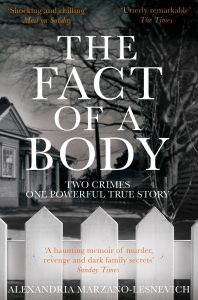 A compelling account of a murder that is also a memoir, by a debut lesbian author.
A compelling account of a murder that is also a memoir, by a debut lesbian author.
As a lawyer, and as the child of two lawyers, Alexandria Marzano-Lesnevich had always been opposed to the death penalty. In theory, it seemed like the most humane position: an eye for an eye did nothing to lower crime statistics. But during her summer internship, Marzano-Lesnevich found herself working on the re-trial of convicted murderer and pedophile Ricky Langley. The horrific case, which shattered two families, provokes strong reactions in her. She wants Langley to receive just punishment. In fact, she wants him to die. And as she works through the case she realizes that underneath all the legal procedures and the meticulous investigation and combing through evidence, the getting to know of witnesses, bystanders and victims, are the layers of her own memory, and the things that happened to her as a child…
Marzano-Lesnevich writes a meticulous and gripping murder mystery that should enthral fans of the genre. But The Fact of a Body also contains other haunting themes, such as how the law may deliver justice but fails to heal. Or the heartache and fear at a grassroots community level that led to the 1994 law requiring a registry for sex offenders, but which will not contribute to a drop in such crimes or protect children from threat. And that threat is often in the person of those closest to them: trusted adults, such as a coach or an uncle, or, as in her own case, a grandfather.
As Marzano-Lesnevich narrates the story of an important case she also uncovers her own history as a little girl and how she came to be who she is…or in spite of it. She is gay and had prolonged coming out as a lawyer because she had been abused as a child and was worried that people would assume that this trauma had caused her sexuality. She also admits that she harboured an eating disorder but the first time she slept with a woman she felt her chest open up as though a restriction on her had been removed. She was gay, and coming out of the closet meant she could stop fighting against who she was. She could stop stifling herself or connecting her true sexuality with a crime. “I’m gay because I love women, it’s as simple as that,” she writes.
And yet the traumatic legacy of her childhood abuse does affect her present-day sex life with her girlfriend and the shadow of it is connected to an impulse she can’t control. The exploration of this theme serves as a moving reminder of why child abuse and the destruction of innocence that goes with it is the worst crime of all. Along with everything else Marzano-Lesnevich is tackling, she bravely goes to the heart of this pain. The scene in which she, as a young adult, confronts her grandfather about the abuse is shocking and revelatory.
This is a book about finding the person inside the killer; trying to break the cycle of abuse so that it doesn’t keep happening, and trying to keep hold of the human values of empathy, mercy, forgiveness, trust and hope.


